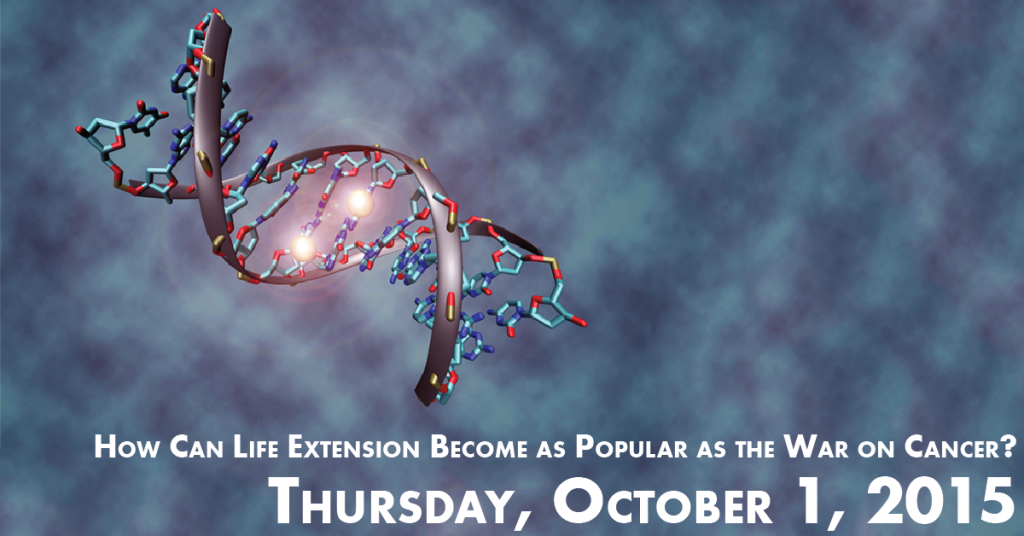How Can Life Extension Become as Popular as the War on Cancer? – MILE Panel
What can be done to raise public support for the pursuit of indefinite life extension through medicine and biotechnology to the same level as currently exists for disease-specific research efforts aimed at cancers, heart disease, ALS, and similar large-scale nemeses?
In this panel discussion, which occurred on October 1, 2015 – International Longevity Day – Mr. Stolyarov asks notable life-extension supporters to provide input on this vital question and related areas relevant to accelerating the pursuit of indefinite longevity. Watch the full discussion here.
This panel is coordinated in conjunction with MILE, the Movement for Indefinite Life Extension.
View the presentation slides prepared by Sven Bulterjis, “Aging Research Needs Marketing: What Can We Learn from Cancer Research?”:
Also see a statement prepared by Peter Rothman for this event. This statement was read out by Mr. Stolyarov during the panel, and panelists’ responses were solicited.
Read the announcement by Keith Comito – “The #LifespanChallenge Starting on October 1 – International Longevity Day”.
See Mr. Comito’s introductory video for the Lifespan Challenge.
*
Panelists
Adam Alonzi is the author of the fiction books “Praying for Death: A Zombie Apocalypse“and “A Plank in Reason”. He is also a futurist, inventor, DIY enthusiast, biotechnologist, programmer, molecular gastronomist, consummate dilletante and columnist at The Indian Economist. Listen to his podcasts at http://adamalonzi.libsyn.com/. Read his blog at https://adamalonzi.wordpress.com/.
Sven Bulterjis is a founder and member of the Board of Directors of Heales – the Healthy Life Extension Society, based in Brussels, Belgium. He has worked as a post-graduate researcher at the SENS Research Foundation and at Yale University. Moreover, he is an Advisor for the Lifeboat Foundation’s A-Prize, whose purpose is to put the development of artificial life forms into the open.
Keith Comito is a computer programmer and mathematician whose work brings together a variety of disciplines to provoke thought and promote social change. He has created video games, bioinformatics programs, musical applications, and biotechnology projects featured in Forbes and NPR.
In addition to developing high-profile mobile applications such as HBO Now and MLB AtBat, he explores the intersection of technology and biology at the Brooklyn community lab Genspace where he helped to create games which allow players to direct the motion of microscopic organisms. Read his Forbes article “Biological Games“.
Seeing age-related disease as one of the most profound problems facing humanity, he now works to accelerate and democratize longevity research efforts through initiatives such as Lifespan.io.
He earned a B.S. in Mathematics, B.S. in Computer science, and M.S. in Applied Mathematics at Hofstra University, where his work included analysis of the LMNA protein.
Roen Horn is a philosopher and lecturer on the importance of trying to live forever. He founded the Eternal Life Fan Club in 2012 to encourage fans of eternal life to start being more strategic with regard to this goal. To this end, one major focus of the club has been on life-extension techniques, everything from lengthening telomeres to avoiding risky behaviors. Currently, Roen’s work may be seen in the many memes, quotes, essays, and video blogs that he has created for those who are exploring their own thoughts on this, or who want to share and promote the same things. Like many other fans of eternal life, Roen is in love with life, and is very inspired by the world around him and wants to impart in others the same desire to discover all this world has to offer.
B.J. Murphy is the Editor and Social Media Manager of Serious Wonder. He is a futurist, philosopher, activist, author and poet. B.J. is an Advisory Board Member for the NGO nonprofit Lifeboat Foundation and a writer for the Institute for Ethics and Emerging Technologies (IEET).
Elizabeth Parrish, CEO of BioViva, is a humanitarian, entrepreneur, and innovator, and is a leading voice for genetic cures. As a strong proponent of progress and education for the advancement of regenerative medicine modalities, she serves as a motivational speaker to the public at large for the life sciences. She is actively involved in international educational media outreach and sits on the board of the International Longevity Alliance (ILA). She is an affiliated member of the Complex Biological Systems Alliance (CBSA), which is a unique platform for Mensa-based, highly gifted persons who advance scientific discourse and discovery.
The mission of the CBSA is to further scientific understanding of biological complexity and the nature and origins of human disease. Elizabeth is the founder of BioTrove Investments LLC and the BioTrove Podcasts, which is committed to offering a meaningful way for people to learn about and fund research in regenerative medicine. She is also the Secretary of The American Longevity Alliance (ALA), a 501(c)(3) nonprofit trade association that brings together individuals, companies, and organizations who work in advancing the emerging field of cellular and regenerative medicine.

